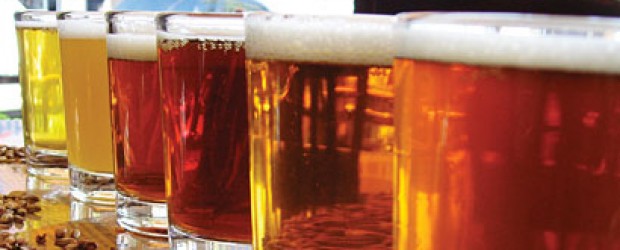Here is the link to the orignal document.
Brasseurs a la Maison are conducting a single hop experiment where we’re brewing the same malt profile, same yeast and different hop.
How It Went Down:
Heat advisory today! Brewing in the middle of the day in July is damn near suicidal. So I think I miscalculated strike temperature because I hit around 152F. Added a little room temp water after about 10 minutes and went under 150. It probably evens out.(we’ll see how it tastes) The boil went fine but after 60 minutes gravity was only at 1.060 which I decided to keep whether than try to boil off more. Cooled down and pitched to ferment at 68F.
The Original Plan:
Name: Single Hop American IPA – Project Nathan
Description: Single infusion targeting 150F means 20 quarts at 161F. The final hops are for dry hopping for final 7 days. The yeast should be 05 not 04. Add irish moss in last 10. Modify 6 gallons of water with 3/4 teaspoon gypsum. 1/3 teaspoon calcium chloride. Put 5 of that in the mash.
Post Boil Volume: 6.00
Pre Boil Volume: 7.00
Mash Time: 60.00
Boil Time: 60.00
Desired Original Gravity: 1.063
Desired Final Gravity: 1.01
Calculated Likely ABV% Based on Specified Gravities: 6.970
Users Targeted ABV%: 7.000
Desired CO2 Volumes: 2
Anticipated Brewhouse Efficiency: 70
Likely Original Gravity at 6.00 Based on Grains and Efficiency: @ 70% = 377 GU = 1.063
Grain: Pale Malt (2 Row) US qty:14
Grain: Caramel/Crystal Malt – 20L qty:1
Hop : Centennial qty:2 at:60 mins. AA=10.00
Hop : Centennial qty:1 at:10 mins. AA=10.00
Hop : Centennial qty:1 at:0 mins. AA=10.00
Hop : Centennial qty:2 at:0 mins. AA=10.00
Yeast: SafAle English Ale qty:1 Max temp: 70.0 Min temp: 64.0
Style Name: ()
Single Hop American IPA - Project Nathan Pocket Brewer XML Code»
<?xml version=”1.0″ encoding=”utf-16″?>
<RecipeClass>
<BREWER>Pocket Brewer</BREWER>
<Type>All Grain</Type>
<VERSION>1</VERSION>
<OriginalGravity>1.063</OriginalGravity>
<OriginalGravityImportExport>1.063</OriginalGravityImportExport>
<FinalGravityImportExport>1.01</FinalGravityImportExport>
<FinalGravity>1.01</FinalGravity>
<BatchSize>6</BatchSize>
<BatchSizeImportExport>6</BatchSizeImportExport>
<BoilVolumeSize>7</BoilVolumeSize>
<BoilVolumeSizeImportExport>7</BoilVolumeSizeImportExport>
<CO2Volumes>2</CO2Volumes>
<BoilTime>60</BoilTime>
<MashTime>60</MashTime>
<TargetABV>7</TargetABV>
<BrewHouseEfficiency>70</BrewHouseEfficiency>
<Name>Single Hop American IPA – Project Nathan</Name>
<Style />
<Description>Single infusion targeting 150F means 20 quarts at 161F. The final hops are for dry hopping for final 7 days. The yeast should be 05 not 04. Add irish moss in last 10. Modify water with 3/4 teaspoon gypsum. 1/3 teaspoon calcium chloride.</Description>
<Yeasts>
<YeastAdditionClass>
<Quantity>1</Quantity>
<Name>SafAle English Ale</Name>
<ProductID>S-04</ProductID>
</YeastAdditionClass>
</Yeasts>
<Hops>
<HopAdditionClass>
<USE>Boil</USE>
<VERSION>1</VERSION>
<NOTES>Use for: General purpose bittering, aroma in American ales and Wheats</NOTES>
<QuantityIO>2</QuantityIO>
<Quantity>2</Quantity>
<QuantityText>2</QuantityText>
<Alpha>10.00</Alpha>
<AlphaText>10.00</AlphaText>
<TinsethIBUS>51</TinsethIBUS>
<IsWholeHop>false</IsWholeHop>
<TimeInMinutes>60</TimeInMinutes>
<TimeInMinutesText>60</TimeInMinutesText>
<Name>Centennial</Name>
<Visible>Visible</Visible>
</HopAdditionClass>
<HopAdditionClass>
<USE>Boil</USE>
<VERSION>1</VERSION>
<NOTES>Use for: General purpose bittering, aroma in American ales and Wheats</NOTES>
<QuantityIO>1</QuantityIO>
<Quantity>1</Quantity>
<QuantityText>1</QuantityText>
<Alpha>10.00</Alpha>
<AlphaText>10.00</AlphaText>
<TinsethIBUS>9</TinsethIBUS>
<IsWholeHop>false</IsWholeHop>
<TimeInMinutes>10</TimeInMinutes>
<TimeInMinutesText>10</TimeInMinutesText>
<Name>Centennial</Name>
<Visible>Visible</Visible>
</HopAdditionClass>
<HopAdditionClass>
<USE>Boil</USE>
<VERSION>1</VERSION>
<NOTES>Use for: General purpose bittering, aroma in American ales and Wheats</NOTES>
<QuantityIO>1</QuantityIO>
<Quantity>1</Quantity>
<QuantityText>1</QuantityText>
<Alpha>10.00</Alpha>
<AlphaText>10.00</AlphaText>
<TinsethIBUS>0</TinsethIBUS>
<IsWholeHop>false</IsWholeHop>
<TimeInMinutes>0</TimeInMinutes>
<TimeInMinutesText>0</TimeInMinutesText>
<Name>Centennial</Name>
<Visible>Visible</Visible>
</HopAdditionClass>
<HopAdditionClass>
<USE>Boil</USE>
<VERSION>1</VERSION>
<NOTES>Use for: General purpose bittering, aroma in American ales and Wheats</NOTES>
<QuantityIO>2</QuantityIO>
<Quantity>2</Quantity>
<QuantityText>2</QuantityText>
<Alpha>10.00</Alpha>
<AlphaText>10.00</AlphaText>
<TinsethIBUS>0</TinsethIBUS>
<IsWholeHop>false</IsWholeHop>
<TimeInMinutes>0</TimeInMinutes>
<TimeInMinutesText>0</TimeInMinutesText>
<Name>Centennial</Name>
<Visible>Visible</Visible>
</HopAdditionClass>
</Hops>
<Grains>
<GrainAdditionClass>
<QuantityIO>14</QuantityIO>
<VERSION>1</VERSION>
<YIELD>79.00</YIELD>
<COLOR>2.0</COLOR>
<ORIGIN>US</ORIGIN>
<SUPPLIER />
<NOTES>Base malt for all beer styles</NOTES>
<Quantity>14</Quantity>
<PotentialSpecificGravity>1.036</PotentialSpecificGravity>
<Type>Grain</Type>
<Name>Pale Malt (2 Row) US</Name>
</GrainAdditionClass>
<GrainAdditionClass>
<QuantityIO>1</QuantityIO>
<VERSION>1</VERSION>
<YIELD>75.00</YIELD>
<COLOR>20.0</COLOR>
<ORIGIN>US</ORIGIN>
<SUPPLIER />
<NOTES />
<Quantity>1</Quantity>
<PotentialSpecificGravity>1.035</PotentialSpecificGravity>
<Type>Grain</Type>
<Name>Caramel/Crystal Malt – 20L</Name>
</GrainAdditionClass>
</Grains>
<Adjuncts />
<MISCS />
<WATERS />
<MASH>
<MASH_STEPS />
<VERSION>0</VERSION>
<GRAIN_TEMP>0</GRAIN_TEMP>
<TUN_TEMP>0</TUN_TEMP>
<SPARGE_TEMP>0</SPARGE_TEMP>
<PH>0</PH>
<TUN_WEIGHT>0</TUN_WEIGHT>
<TUN_SPECIFIC_HEAT>0</TUN_SPECIFIC_HEAT>
</MASH>
<Id>f6ed1572-ebfc-4de5-a5ae-2cd3833eabf4</Id>
<BrewHouse>
<Efficiency>70</Efficiency>
</BrewHouse>
</RecipeClass>
<?xml version=”1.0″ encoding=”utf-16″?>
<RECIPE>
<NAME>Single Hop American IPA – Project Nathan</NAME>
<VERSION>1</VERSION>
<TYPE>All Grain</TYPE>
<NOTES>Single infusion targeting 150F means 20 quarts at 161F. The final hops are for dry hopping for final 7 days. The yeast should be 05 not 04. Add irish moss in last 10. Modify water with 3/4 teaspoon gypsum. 1/3 teaspoon calcium chloride.</NOTES>
<BREWER>Pocket Brewer</BREWER>
<BATCH_SIZE>22.7115</BATCH_SIZE>
<BOIL_TIME>60</BOIL_TIME>
<BOIL_SIZE>26.4968</BOIL_SIZE>
<EFFICIENCY>70</EFFICIENCY>
<FG>1.01</FG>
<OG>1.063</OG>
<CARBONATION>2</CARBONATION>
<HOPS>
<HOP>
<NAME>Centennial</NAME>
<VERSION>1</VERSION>
<ALPHA>10.00</ALPHA>
<AMOUNT>0.0567</AMOUNT>
<USE>Boil</USE>
<TIME>60</TIME>
<NOTES>Use for: General purpose bittering, aroma in American ales and Wheats</NOTES>
</HOP>
<HOP>
<NAME>Centennial</NAME>
<VERSION>1</VERSION>
<ALPHA>10.00</ALPHA>
<AMOUNT>0.0283</AMOUNT>
<USE>Boil</USE>
<TIME>10</TIME>
<NOTES>Use for: General purpose bittering, aroma in American ales and Wheats</NOTES>
</HOP>
<HOP>
<NAME>Centennial</NAME>
<VERSION>1</VERSION>
<ALPHA>10.00</ALPHA>
<AMOUNT>0.0283</AMOUNT>
<USE>Boil</USE>
<TIME>0</TIME>
<NOTES>Use for: General purpose bittering, aroma in American ales and Wheats</NOTES>
</HOP>
<HOP>
<NAME>Centennial</NAME>
<VERSION>1</VERSION>
<ALPHA>10.00</ALPHA>
<AMOUNT>0.0567</AMOUNT>
<USE>Boil</USE>
<TIME>0</TIME>
<NOTES>Use for: General purpose bittering, aroma in American ales and Wheats</NOTES>
</HOP>
</HOPS>
<FERMENTABLES>
<FERMENTABLE>
<NAME>Pale Malt (2 Row) US</NAME>
<VERSION>1</VERSION>
<AMOUNT>6.3503</AMOUNT>
<TYPE>Grain</TYPE>
<YIELD>79.00</YIELD>
<COLOR>2.0</COLOR>
<ORIGIN>US</ORIGIN>
<SUPPLIER />
<NOTES>Base malt for all beer styles</NOTES>
<COARSE_FINE_DIFF>1.50</COARSE_FINE_DIFF>
<MOISTURE>4.00</MOISTURE>
<DISASTATIC_POWER>140.0</DISASTATIC_POWER>
<PROTEIN>12.30</PROTEIN>
<MAX_IN_BATCH>100.00</MAX_IN_BATCH>
<POTENTIAL>1.036</POTENTIAL>
</FERMENTABLE>
<FERMENTABLE>
<NAME>Caramel/Crystal Malt – 20L</NAME>
<VERSION>1</VERSION>
<AMOUNT>0.4536</AMOUNT>
<TYPE>Grain</TYPE>
<YIELD>75.00</YIELD>
<COLOR>20.0</COLOR>
<ORIGIN>US</ORIGIN>
<SUPPLIER />
<NOTES />
<COARSE_FINE_DIFF>1.50</COARSE_FINE_DIFF>
<MOISTURE>4.00</MOISTURE>
<DISASTATIC_POWER>0.0</DISASTATIC_POWER>
<PROTEIN>13.20</PROTEIN>
<MAX_IN_BATCH>20.00</MAX_IN_BATCH>
<POTENTIAL>1.035</POTENTIAL>
</FERMENTABLE>
</FERMENTABLES>
<MISCS />
<WATERS />
<YEASTS>
<YEAST>
<NAME>SafAle English Ale</NAME>
<TYPE>Ale</TYPE>
<VERSION>0</VERSION>
<FORM>Dry</FORM>
<AMOUNT>1</AMOUNT>
<LABORATORY>DCL Yeast</LABORATORY>
<PRODUCT_ID>S-04</PRODUCT_ID>
<MIN_TEMPERATURE>64.0</MIN_TEMPERATURE>
<MAX_TEMPERATURE>70.0</MAX_TEMPERATURE>
<ATTENUATION>73.00</ATTENUATION>
<NOTES>Fast starting, fast fermenting yeast. Quick attenuation helps to produce a clean, crisp, clear ale. Can be used in a wide range of ales.</NOTES>
<BEST_FOR>Great general purpose ale yeast.</BEST_FOR>
<FLOCCULATION>Medium</FLOCCULATION>
</YEAST>
</YEASTS>
<MASH>
<MASH_STEPS />
<VERSION>0</VERSION>
<GRAIN_TEMP>0</GRAIN_TEMP>
<TUN_TEMP>0</TUN_TEMP>
<SPARGE_TEMP>0</SPARGE_TEMP>
<PH>0</PH>
<TUN_WEIGHT>0</TUN_WEIGHT>
<TUN_SPECIFIC_HEAT>0</TUN_SPECIFIC_HEAT>
</MASH>
<STYLE>
<STYLE_LETTER />
<STYLE_GUIDE>BJCP</STYLE_GUIDE>
<VERSION>1</VERSION>
<OG_MIN>0</OG_MIN>
<OG_MAX>0</OG_MAX>
<FG_MIN>0</FG_MIN>
<FG_MAX>0</FG_MAX>
<IBU_MIN>0</IBU_MIN>
<IBU_MAX>0</IBU_MAX>
<COLOR_MIN>0</COLOR_MIN>
<COLOR_MAX>0</COLOR_MAX>
<ABV_MIN>0</ABV_MIN>
<ABV_MAX>0</ABV_MAX>
</STYLE>
</RECIPE>


